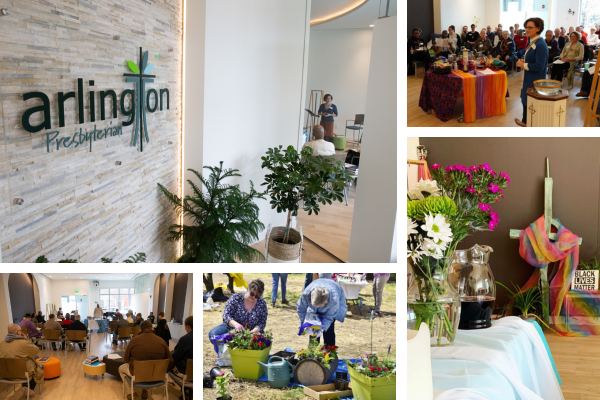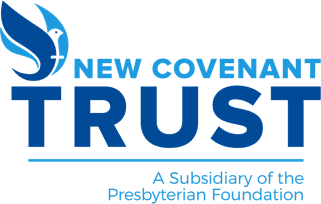
Community and connection.
Those two words encapsulate the vision of Arlington Presbyterian Church (APC), a small congregation of about 55 in one of most racially and ethnically diverse ZIP codes in the Greater Washington, D.C., region — and also one of the most economically challenged.
The church is located in 3,000 square feet on the first floor of Gilliam Place, a 173-unit affordable housing apartment community on the site of APC’s previous building on Columbia Pike in South Arlington, Va.
In response to the struggles of many of its neighbors, APC was called to sell the property to the Arlington Partnership for Affordable Housing (APAH) in 2016. APAH tore down the old church building to make way for the much-needed new development.
“The call to create affordable housing was bigger than the old building itself – so, the walls came down,” a church member noted at the time.
It was more than walls that fell, added Pastor Ashley Goff, who joined APC in July 2018. “When you blow down buildings, you blow down lots of other things, like your allegiance to the past and your devotion to a building and old systems. One thing that we realized that needed work was our relationship with money.”
Church leaders hired nonprofit consulting firm, the Vandersall Collective, to help evaluate the church’s past patterns with finances, help them heal their relationship with money, and ultimately look at it in a new way. The congregation was reminded through this process that “our collective power — our ability to act — comes from God,” said Goff.
Out of that work came APC’s core values and vision, which drives all its ministry work today.
Making Money Matter
A recent example of APC’s ministry in action came about a year ago, when APAH approached Goff about helping some Gilliam Place tenants who were facing eviction. In response, the congregation used proceeds from its investments managed by New Covenant Trust Company (NCTC) and collected a special offering to help fund an “eviction clinic,” in which 80 families’ rental debt was wiped out. Soon after, APC was asked to provide rental assistance to 30 more families, reducing their monthly rent by 50% for a period of two years.
In evaluating both these requests from APAH, church leaders did two things. First, they used APC’s core values as a discernment tool, said Goff. “We asked, ‘Is it place-based? Is it communal? Is it relational? Is it transformational? Is it justice-focused? Is it prayerful?’”
APC also asked NCTC, which is part of the Presbyterian Church (U.S.A.) Foundation, to evaluate its financial data to determine the impact of allocating church funds to these initiatives. “So, we used our tool of discernment, and we used data from the Foundation for this discernment,” said Goff. “That way, we had a values-based conversation vs. a scarcity-driven conversation, like: ‘What if we run out of money? What if there’s not enough?’ Well, the numbers showed us that we’re fine.”
But just as important, Goff added, was fulfilling the church’s calling to serve.
“The larger question is, ‘How are we showing up for our neighbors?’ We’re trying to disrupt these systems that are inherently broken, where money has been used to create harm, particularly for people of color. Our role as people of faith with money is to do something transformative and radical.”
The eviction clinic and rental assistance projects totaled about $400,000 — funds that have truly been transformative to the residents of Gilliam Place.
Making a Daily Impact
APC’s work doesn’t have to be on a grand scale to make an impact.
The church hosts a food bank every Monday, where neighborhood residents can get supplemental, free, nutritious groceries. APC’s minister of music also offers free piano and guitar lessons once a week. And of course, all residents are welcome at Sunday worship service.
While APC rents its space along with all the other tenants, it owns about 12,000 square feet of green space at the end of the block that serves as “the backyard of Gilliam Place,” where neighbors may gather anytime they wish, Goff said.
While most of its ministry work takes place at Gilliam Place and in the immediate surrounding community, APC is also reaching across the world with its water ministry, which raises money to build clean water wells in Cameroon. Two of APC’s members are Cameroonian immigrants who noticed the unacceptable lack of fresh water on a recent visit to their former home nation. They brought this issue to APC, who was happy to help.
“I think this stands out as the congregation’s ability to listen to an internal storytelling moment that impacts the wider global community,” said Goff. Five communities in Cameroon now have clean water thanks to this effort.
A New Mindset
In the five years since Goff arrived at APC, she has witnessed the shift in how the congregation makes decision about money. It has been a truly spiritual transformation. “It’s just like magic,” she said. “I know that’s not a theological word, but it is magic, you know?”
After the sale of the property to APAH in 2016, APC invested about $6.5 million of the proceeds with a large, well-known investment firm, which Goff said was “not great. They treated us like just another blip on their very large radar.”
So in 2020, the church session voted to move its investments to NCTC, and they could not be more pleased with the relationship.
“New Covenant has met us where we are. They are helping us heal our money story and envision something really, really new,” said Goff. “They’re not trying to make us into something else. It’s a real partnership.”
We are honored to support the great work of Pastor Goff and Arlington Presbyterian Church. For more about their ministry, visit arlingtonpresbyterian.org.
